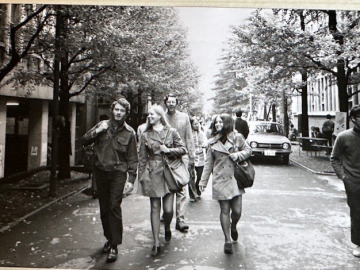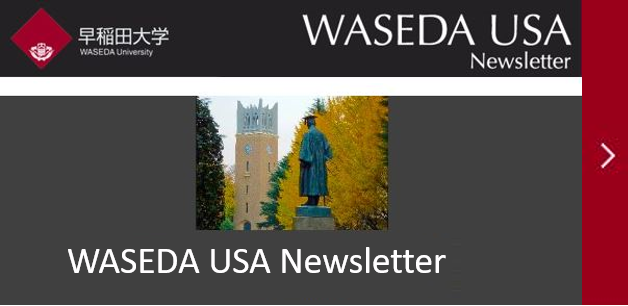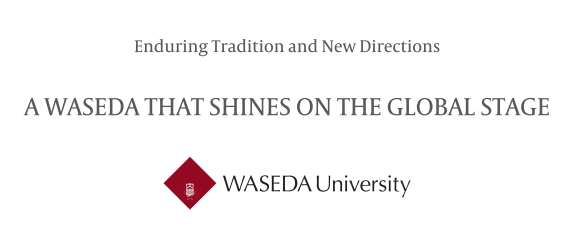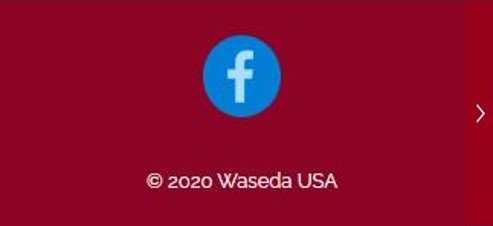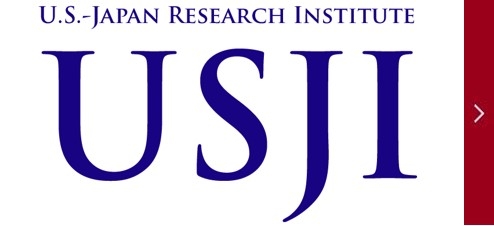Wil Yates
Waseda International Division
August 1969 – May 1970
Waseda Reflections
(日本語は英語の次にあります)
When I boarded my flight to Tokyo in August 1969, I had no idea that my life was about to change forever. How did I get here? Sheer luck.
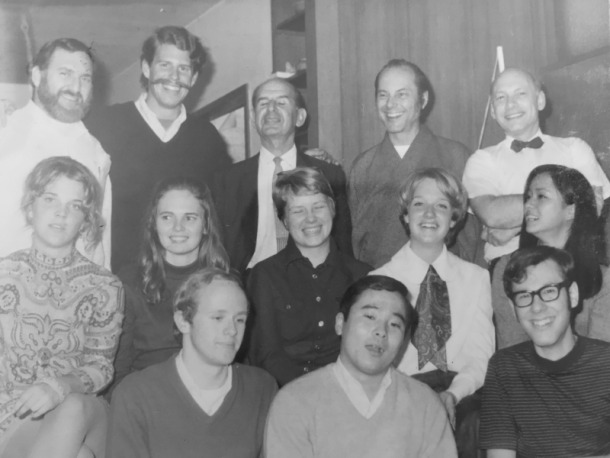
A Diplomacy and World Affairs Degree candidate at Occidental College, I was required to be fluent in one language other than my mother tongue, English.
Having studied French for six years in junior and senior high school, I had applied to study at the University of Genève during my junior year to achieve fluency. My application arrived one day late and was declined. One day later, I learned that Occidental’s Religion Department was participating in a pilot program to send five students to Waseda University in Tokyo. I thought, why not give it a shot? So, I did. And to my surprise, and good fortune, I was one of the chosen five.
I knew little about Japan – just that the country produced cheap cars, cheap radios and had gotten blown up during the Second World War. I was headed to a country whose language of which I knew 6 words: kamikaze, Fuji, typhoon, sushi, samurai, hara-kiri. Not exactly ingredients for making pleasant conversation.
I arrived in Japan while the Vietnam War and student strife raged around the globe. During a week-long orientation, I learned that the Waseda campus had been occupied and closed by radical student factions and that our studies would take place off-site in Ichigaya, until at least late fall.
I settled in with my host family in Tachikawa, the Manos. They offered up their home to a totally unknown American because they wanted to extend the kindnesses their daughter had experienced during a home stay on a college year in Missouri.
The family consisted of the father and mother, their daughter and son, and two maids. All were kind, gracious and welcoming.
My Japanese brother was a third-year student at Keio. He drove a sporty red Japanese version of an MG convertible. Despite my being – or perhaps because I was – a Waseda student, he drove me around and began teaching me Japanese words that I should not use in polite company – something I learned the hard way.
My commute to the center of Tokyo was not short. But daily I got to interact with everyday Japanese in close quarters. It was a challenge given that I still had had no language training. Only once did I encounter hostility – from someone who had bad experiences with the occupying forces, said those on the train who came to my aid and formed a barrier around me until the guy hurling epithets left the train. I felt protected rather than threatened.
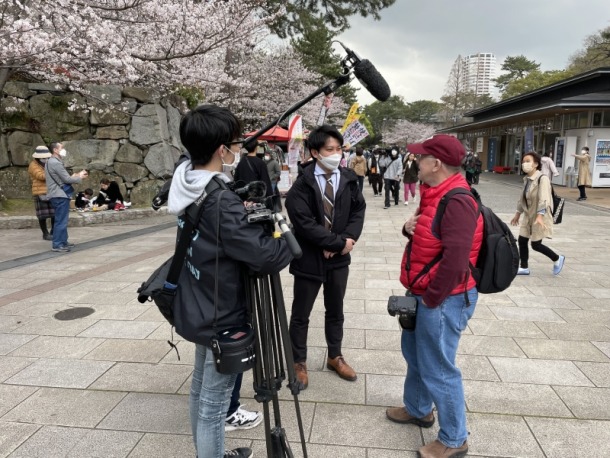 When I made it to the Lutheran Center for class the first time, I learned that I would have only three classes. Shock! Joy!! But… one of which was Japanese language: three hours a day, five days a week during the fall and spring semesters; five hours a day, five days a week during the short winter term. Oof!
When I made it to the Lutheran Center for class the first time, I learned that I would have only three classes. Shock! Joy!! But… one of which was Japanese language: three hours a day, five days a week during the fall and spring semesters; five hours a day, five days a week during the short winter term. Oof!
The language classes got me out of bed, on to the crowded trains and in my seat. I soaked up the language like a thirsty camel. The six words I knew when I arrived became part of an ever-expanding lexicon. Learning hiragana in a week, followed by learning katakana the following week was equivalent to handing a blindman a cane. Recognizing my illiteracy was painful! But kanji acquisition meant I could read! My world exploded with newspapers, books and magazines, maps, subway signs, advertisements, rules and regulations!
My recollection of the other classes is vague. But they provided the historical, political, sociological, and cultural context I needed to make my experience in Japan fulsome and robust.
One of my fellow students lived with the owner of a camera store. The owner sold me a basic Pentax SLR 35mm camera and taught me how to take quality photos. He critiqued and encouraged my efforts. He developed my photos in his darkroom, where I watched and learned through hands-on experience.
By the end of the winter term, I had sufficient confidence in my language skills to fly on my own to Hokkaido. I spent the six-week interval between winter and spring terms hitchhiking and taking photos from Sapporo to Nagasaki, catching rides with truck drivers, salesmen, housewives and families. My language skills blossomed as I encountered dialects and pronunciations far removed from NHK-standard Japanese.
At the time, most westerners in Japan were U.S. military. A blonde non-threatening anomaly, I became an object of curiosity which opened doors to homes, shared dinners and drinks at akachochin and robatayakiya. People kindly shared moments of their lives with me.
I knew by the time I returned to Tokyo that I was hooked on Japan and wanted to come back.
It took a year after graduation to return – through the YMCA’s Overseas Service Corps program that predated and was a model for the Peace Corps. The OSCY program sent young people to Japan, Taiwan, South Korea and Lebanon to teach English conversation at local YMCAs. My assignment was at the Nagoya YMCA, where for 5 years I taught middle school, high school, juku and college students, as well as housewives, businessmen and retired folks.
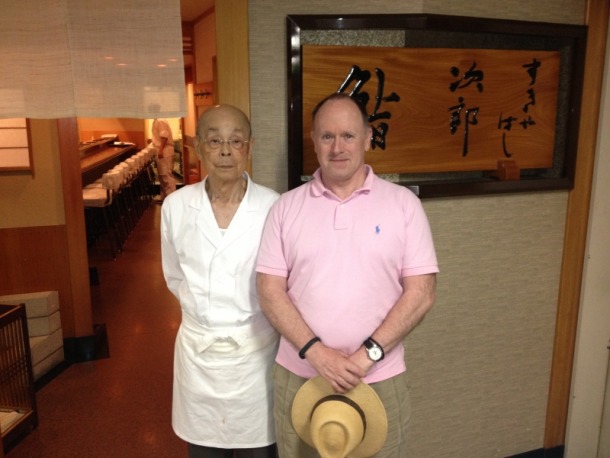
Within a year I was elected president of the foreign teachers’ group, serving as the ombudsman for non-Japanese teachers at YMCAs across the country. In this role, I acted as an intermediary when issues arose between the teachers, their employing YMCA and the National Council of the YMCAs of Japan (Nihon YMCA Dōmei). This led to my joining the National Council in Tokyo as a local hire for eight years on the international staff, working with and traveling to YMCAs in Japan, South Korea, Taiwan and the United States.
That work led to eight years with the YMCA of the USA, running the OSCY program and serving as chief of staff to the YMCA’s World Urban Network, a consortium of the 100 largest YMCAs around the globe, focused on community issues for which common solutions could be found, shared and implemented.
My time at Waseda lead to a 25-year career with the Y in Japan and the USA. It also led to a two-year stint with Japan Travel Bureau in New York City after I left the Y in 1993.
After obtaining a master’s degree in library science, my experience in Japan and language skills also came into play during my 13-year tenure with Pfizer’s International Division’s Competitive Intelligence group for which I traveled to East Asia to survey local markets and assess Pfizer’s performance and prospects.
I met my banker husband in 1998. After we met, he joined MUFG. I served as his secret weapon, helping him navigate the shoals and shallows of working for a Japanese corporation. I also traveled with him on business to Japan multiple times, facilitating solutions to cross-cultural misunderstandings and maximizing opportunities.
In 2023, family and friends circumnavigated Honshu by ship to introduce them to a land I love – and for hanami. Ours was the first international cruise ship to call on many of the ports where we docked. The cities went all out to welcome us, with bands, mascots, flag-waving children, and families waiting to greet us and to send us off.
At our first port of call, as we disembarked, I called out “Gokkuro-sama” to the Japanese dockhands. Heads popped up. The next thing I knew I was being interviewed by local press. That continued throughout the voyage.
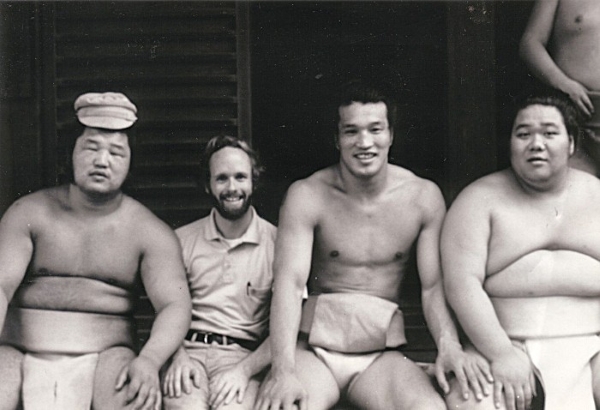 In Kitakyushu, at Kokura-jo to see the cherry blossoms, I happened to be wearing a Waseda baseball cap and was stopped by a young NHK TV reporter, who asked me in English “Why are you wearing a Waseda baseball cap?” I responded in Japanese that I am an alumnus of Waseda’s International Division. The fellow replied, “Huh! I’m a Keio graduate.” To which I responded, “So sorry about Keio’s loss in the So-Kei-sen!” After which we bantered back and forth about the cherry blossoms, the trip and how much I and my fellow travelers were enjoying Japan.
In Kitakyushu, at Kokura-jo to see the cherry blossoms, I happened to be wearing a Waseda baseball cap and was stopped by a young NHK TV reporter, who asked me in English “Why are you wearing a Waseda baseball cap?” I responded in Japanese that I am an alumnus of Waseda’s International Division. The fellow replied, “Huh! I’m a Keio graduate.” To which I responded, “So sorry about Keio’s loss in the So-Kei-sen!” After which we bantered back and forth about the cherry blossoms, the trip and how much I and my fellow travelers were enjoying Japan.
My connection with Japan continues. This November my husband and I will bring my namesake nephew and his wife, accompanied by my brother and his wife to Japan for two weeks – a week based in Tokyo and a week based in Kyoto – to share with them our love for Japan and its people, which in my case has been nearly life-long.
I plan to call on the International Division during my visit to express my heartfelt thanks for a year that changed my life in a myriad of wonderful ways. I also want to honor a young staffer of the International Division who took ignorant me under his wing, for which I will always be grateful. I am embarrassed that I do not recall his name, but I truly treasure the help he provided.
心から感謝致します。
(Photos, from top to bottom: 1) From year at Waseda – front row, far left; 2) March 2023, wearing Waseda cap, being interviewed by NHK; 3) June 2013, lunch at Sushi Jiro; 4) Mid 70’s, from time in Nagoya at the Nagoya Basho.)
ウィル・イェーツ
早稲田大学国際部 1969年8月 ~ 1970年5月
早稲田大学・留学回想録
1969年8月、東京行きの飛行機に乗った私は、今まさに自分が人生の分岐点にいるとは思ってもみませんでした。私がはどうやってここまで来たのか、それは幸運というしかありませんでした。
オクシデンタル・カレッジで外交学と国際情勢を専攻していた私は、母国語である英語以外の言語を何か一つ、流暢に話せるようになる必要がありました。
中学と高校で6年間フランス語を学んだ私は、流暢なフランス語を身につけるため、大学3年生のときにジュネーブ大学への留学を志願しました。1日遅れで届いた私の願書は、却下されました。その翌日、オクシデンタルの宗教学部が東京の早稲田大学に5人の学生を送る試験的プログラムに参加していることを知りました。やってみようじゃないか、と思い申し込んだところ、驚いたことに、幸運にも私は5人のうちの1人に選ばれました。
当時の私は、日本についてほとんど知りませんでした。安い車と安いラジオを生産し、第二次世界大戦中に爆撃された国だというくらいの認識でした。カミカゼ、フジヤマ、タイフウ、スシ、サムライ、ハラキリ。この6語しか言葉を知らない国へ向かっている……。これで満足できる会話ができるわけがないことは明らかでした。
私が来日した頃は、ベトナム戦争と学生紛争が世界中で激化していました。一週間にわたるオリエンテーションで、早稲田キャンパスが過激派の学生によって占拠され閉鎖されたこと、少なくとも晩秋までは学外の市ヶ谷で勉強することを告げられました。
私は立川にあるマノ家というホストファミリーの元で暮らすことになりました。彼らは娘がミズーリの大学に1年間留学し、ホームステイ先の家庭でとても親切にしてもらった経験から、私のような見ず知らずのアメリカ人にも同じようにしてあげたいと思い、家を提供してくれたのでした。
家族構成は、父親と母親、娘と息子、そして2人のお手伝いさんでした。みんな親切で、品があり、私を歓迎してくれました。
そこでいわゆる私の「日本のお兄さん」となった息子は、慶應大学の3年生でした。彼はMGコンバーチブルの赤のスポーティな日本仕様車に乗っていました。私が早稲田の学生だったにもかかわらず、いや、早稲田の学生だったからこそなのか、私を車に乗せては、礼儀正しい場では使ってはいけない日本語を教えてくれました。
東京の中心部までの通学時間は決して短くはありませんでしたが、日本人の日常生活に毎日至近距離で接することができました。まだ語学の訓練を受けていない当時の私にとって、それは大変なことでもありました。一度だけ敵意のある人に遭遇したことがあります。占領軍に嫌な思いをさせられたことがある人だったようですが、その時、電車に乗っていた他の人たちが私を助けに来てくれて、私に罵声を浴びせた人が電車を降りるまで、私の周りを囲んで守ってくれました。危険な目に遭いながらも、むしろ守られていると感じた出来事でした。
授業を受けるために初めてルーテルセンターに行ったとき、私が履修するのは3科目のみと知り、とても驚きました。しかし、そのうちの一である日本語の授業は、 秋学期と春学期の間、週5日、1日3時間、冬学期は週5日、1日5時間もの授業があることが分かりました。あぁ・・・。
日本語の授業に出席するため、私は毎日ベッドから起き出て、満員電車に乗り込み、教室に向かいました。私はまるでのどが渇いたラクダのように言葉を吸収しました。たった6つの単語しか知らないで来日した私の語彙は、日増しに増え続けました。一週間でひらがなを覚え、翌週にはカタカナを覚え、手応えを感じると同時に、自分があまりにも文字を認識できないことに苦痛を感じていました。しかし漢字を習得すると、あらゆるものが読めるようになりました。私の世界は、新聞、本、雑誌、地図、地下鉄の標識、広告、ルールや規則などで爆発的に広がりました!
それ以外の授業については、正直曖昧な記憶しかありませんが、授業で得た歴史や政治、社会学、文化に関する知識のおかげで、私の日本での経験はより充実したものになりました。
仲間の留学生のうちの一人は、カメラ店のオーナーと一緒に住んでいました。私はそのオーナーからペンタックスの一眼レフ35ミリカメラを買い、質の高い写真の撮り方を教えてもらいました。彼は私の作品を見て意見を述べ、励ましてくれました。暗室で私の写真を現像するところを見せてもらい、実地で学ぶことができました。
冬学期が終わるころには、私は自分の語学力に十分な自信がついたので、一人で飛行機に乗って北海道へ向かいました。冬学期と春学期の間の6週間、札幌から長崎まで、トラックの運転手や営業マン、主婦や家族連れの車をヒッチハイクしながら移動し、写真を撮り続けました。NHKで流れる標準語とはかけ離れた方言や発音に出会い、私の語学力はさらに向上しました。
当時、日本にいる西洋人のほとんどは米軍関係者でした。金髪で脅威を与えない変わった見た目の存在だったからか、私は人々の好奇の対象となり、家に呼ばれたり、赤ちょうちんや炉端焼き屋で一緒に食べたり飲んだりもしました。多くの親切な人々が私と人生のひとときを分かち合ってくれました。
東京に戻る頃には、私は日本に夢中で、また戻って来たいと思うようになっていました。
平和部隊(Peace Corps)の前身でありモデルとなったYMCAの海外奉仕団(OSCY)プログラムを通じて私が日本に戻ってきたのは、卒業から1年後のことでした。OSCYプログラムは、日本、台湾、韓国、レバノンに若者を派遣し、現地のYMCAで英会話を教えるというものでした。私はYMCA名古屋に赴任し、5年間、中学生、高校生、塾生、大学生、主婦、ビジネスマン、定年退職した人たちに英語を教えました。
1年も経たないうちに、私は外国人教師グループの会長に選出され、全国のYMCAの外国人教師のオンブズマンの役割を果たしました。私の役割は、外国人教師と勤務先のYMCA、日本YMCA同盟の間で問題が起きたとき、仲介役を務めることでした。このことがきっかけとなり、私は東京の全国YMCA協議会に現地採用の国際スタッフとして8年間在籍し、日本中のYMCAや韓国、台湾、アメリカのYMCAとの仕事で各地を訪れました。
その結果、米国YMCAで8年間、OSCYプログラムを運営し、YMCAのワールド・アーバン・ネットワークのチーフ・オブ・スタッフを務めることになりました。ワールド・アーバン・ネットワークは、世界中にある最大規模の100のYMCAからなるコンソーシアムであり、地域社会の問題に焦点を当て、共通の解決策を見つけ、共有し、実施しています。
私の早稲田大学での経験が、日本とアメリカのYMCAでの25年間のキャリアにつながりました。また、1993年にYMCAを退職した後は、ニューヨークのJTBに2年間勤務しました。
図書館学の修士号を取得した後、13年間在籍したファイザーの国際部門・競合情報分析グループでも、日本での経験と語学力が活かされ、東アジアに出向いて現地市場を調査し、ファイザーの業績と見通しを評価しました。
銀行員の夫とは1998年に出会いました。私たちが出会った後、彼はMUFGに入社しました。私は夫の秘密兵器として、日本企業で働く際に気を付けることをアドバイスしました。また、夫の日本への出張に何度か同行し、異文化間の誤解を解く調整をし、彼がチャンスを最大限に生かせるよう手助けしました。
2023年には、家族や友人を連れて船で本州を一周し、私が愛する日本を紹介しながら花見も楽しみました。私たちの船が停泊した港の多くは、国際クルーズ船が初めて寄港する港で、街は総出で私たちを歓迎し、バンドやマスコット、旗を振る子供たち、出迎えや見送りの家族連れで賑わいました。
最初の寄港地で下船するとき、私は日本の港湾労働者に、「ご苦労様!」と日本語で声をかけました。皆とても驚いて、私は地元のマスコミのインタビューを受けることになりました。それは航海中ずっと続きました。
北九州にある小倉城で花見をしていたときには、たまたま私が早稲田大学の野球帽をかぶっていたところ、NHKの若いリポーターに呼び止められ、英語で 「Why are you wearing a Waseda baseball cap? 」と聞かれました。私は日本語で「早稲田大学国際部の元留学生です」と答えました。その記者は「へえ!私は慶應大学卒業なんです」と答えました。それに対して私は、「早慶戦では慶應が負けて残念でしたね!」と返しました。そのまま桜のことや今回の旅行のこと、そして私や仲間の旅行者たちがどれほど日本を楽しんでいるかについて、会話は続きました。
日本と私とのつながりは、今も続いています。今年の11月に夫と私は、私の名前を受け継いだ甥とその妻、そして私の兄とその妻を連れて2週間日本を訪れることにしています。私がこれまでの人生でしてきたように、日本とその人々への愛を彼らと分かち合うため、東京と京都に一週間ずつ滞在する予定です。
その間、私は早稲田大学国際部に訪問し、数え切れないほど素晴らしい経験をした早稲田での一年が私の人生を変えてくれたと、感謝の意を伝えたいと思っています。また、無知な私を手取り足取り教えてくれた当時の国際部の若いスタッフにも敬意を表したいです。恥ずかしながら彼の名前を思い出せませんが、彼のサポートには本当に感謝の言葉もありません。
心から感謝致します。
(写真は上から順に:1) 早稲田大学在学時 – 最前列左端)、2)2023年3月、早稲田大学のキャップをかぶり、NHKのインタビューを受けるている、3)2013年6月、「すし次郎」でランチ、4) 70年代半ば、名古屋で名古屋場所を見たとき。)

